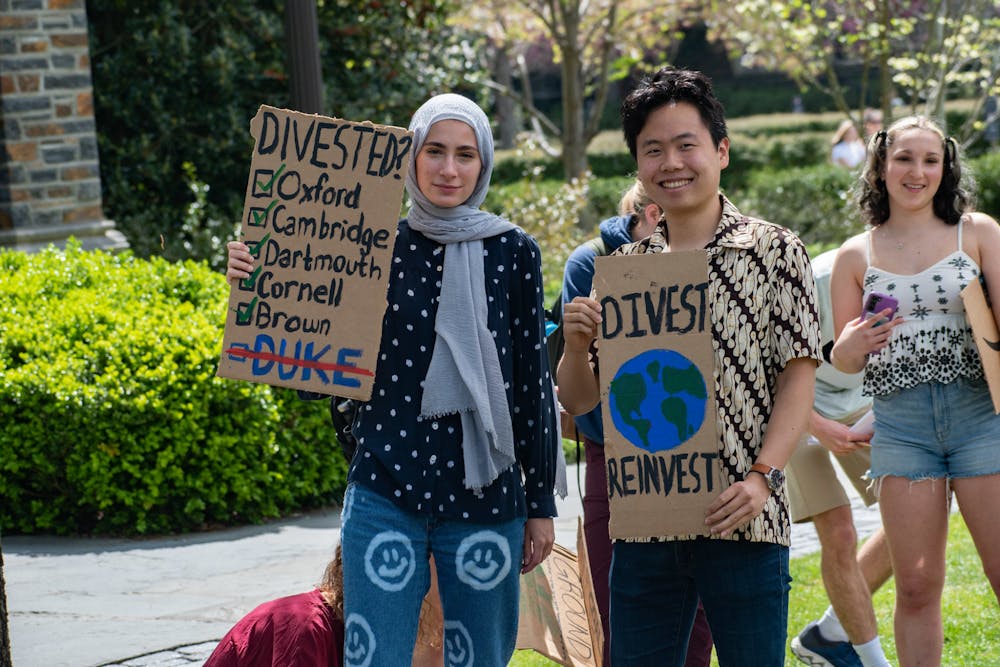Students and environmental groups convened for a forum on Oct. 25 hosted by the Undergraduate Environmental Union to discuss possible improvements to the Duke Climate Commitment.
The Climate Commitment, announced in late September, aims to increase the University’s role in tackling the climate crisis through four focus areas: energy transformation, climate and community resilience, environmental and climate justice and data-driven climate solutions. While these aims are seen as a step forward, some students have been critical of the Commitment.
Undergraduate Environmental Union President Isabel Wood, a senior, said the UEU held a board meeting where representatives from different Duke environmental clubs agreed a student forum would be necessary for students to share student voices.The UEU is a Duke Student Government subcommittee serving as an advisory board for all environmental and sustainability programming.
Senior Leah Roffman, former president and membership lead of Duke Environmental Alliance, attended the forum and said that a common frustration was the little student input Duke considered when developing goals for the Climate Commitment.
“It seems that there was no acknowledgment of ongoing student efforts to make Duke climate-conscious in the formation of this plan,” Roffman wrote in an email to The Chronicle.
Wood said that students at the forum agreed with Roffman.
“People were kind of like, ‘We just don't feel like there are enough specifics, we feel like they're not taking student voices into account,’” Woods said.
The Chronicle reached out to Chris Simmons, interim vice president for public affairs and government relations, for comment. Simmons wrote that the 2020-2021 Climate Change and Sustainability Strategic Task Force developed recommendations for the Climate Commitment.
The task force “included two undergraduate student representatives and two graduate and professional student representatives,” Simmons wrote. “There were a number of students involved with the kickoff events in late September and over a dozen students from across the university involved with planning and implementing UNIV102, which will be the flagship course for the Climate Commitment.”
Roffman also believes the allocation of funds for climate initiatives is a positive change, but she would like to see more transparency as “it is unclear exactly how the Climate Commitment funding is being distributed,” she wrote.
A Giving to Duke release detailed how some of the funds will be distributed. The Duke Endowment’s gift of $5 million launched several “initial efforts,” including helping to solidify a Duke Climate Commitment primary goal around climate fluency for all students.
The $6.45 million that came from donor families will “strengthen Duke’s climate fluency efforts,” endow the professorship in environmental economics or policy in the Nicholas School of the Environment and support courses and co-curricular activities in climate finance, among other initiatives.
The release did not specify how the $25 million from the Nicholas family will be used.
The conclusion of the forum prompted the environment groups to start a document relaying student perspectives on the Climate Commitment.
“The goal of [the document] is to show administration that student voices, undergraduate and graduate student voices, should play a major role in giant University decisions,” Wood said.
In particular, Wood pointed out that the Climate Commitment does not mention plans for the University to divest from fossil fuels, which has spurred recent protests by students.
“The [Climate Commitment] was focused on making sure that students had access to climate opportunities, like research or classes, but there wasn't a lot of discussion in the announcement about divestment or about procurement or more so internal workings of the University,” Wood said.
Communication between students and administration continues to be a point of confusion for Wood. While she believes environmental groups can rely on Sustainable Duke staff, it is still difficult to communicate to the “big admin … like President Price level admin” about the problems that environmental groups on campus are working on.
“If [the Duke administrators] really want climate commitment, they might as well talk to the people who have been working on it for a while,” Wood said.
Get The Chronicle straight to your inbox
Signup for our weekly newsletter. Cancel at any time.

Michael Ramos is a Trinity first-year and a staff reporter of The Chronicle's 118th volume.

